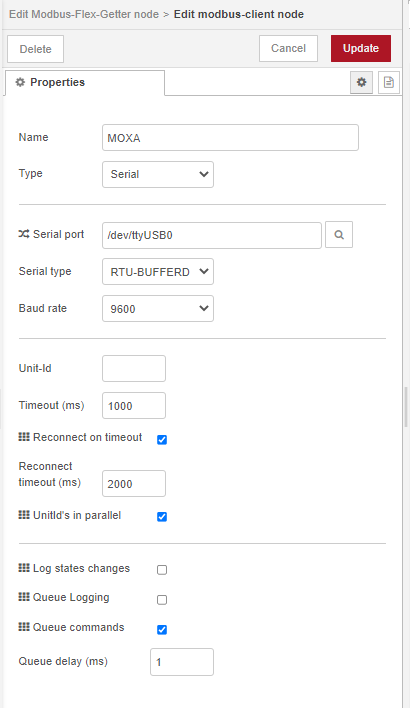Here is the code I been testing with now
[{"id":"bdc7638d.9337f","type":"debug","z":"54bc74df.bb994c","name":"","active":true,"tosidebar":true,"console":false,"tostatus":false,"complete":"false","statusVal":"","statusType":"auto","x":1390,"y":400,"wires":[]},{"id":"87186745.9fbb98","type":"modbus-flex-getter","z":"54bc74df.bb994c","name":"","showStatusActivities":false,"showErrors":false,"logIOActivities":false,"server":"b500f1a.e0fdb1","useIOFile":false,"ioFile":"","useIOForPayload":false,"emptyMsgOnFail":false,"keepMsgProperties":false,"x":1210,"y":400,"wires":[["bdc7638d.9337f"],[]]},{"id":"ee6cad7b.ba46f","type":"function","z":"54bc74df.bb994c","name":"","func":"msg.payload = { value: msg.payload, 'fc': 3, 'unitid': 14, 'address': 0 , 'quantity': 7 }\nreturn msg","outputs":1,"noerr":0,"initialize":"","finalize":"","x":1000,"y":400,"wires":[["87186745.9fbb98"]]},{"id":"96f51396.8f0c8","type":"inject","z":"54bc74df.bb994c","name":"","props":[{"p":"payload"},{"p":"topic","vt":"str"}],"repeat":"3","crontab":"","once":false,"onceDelay":0.1,"topic":"","payload":"","payloadType":"date","x":850,"y":400,"wires":[["ee6cad7b.ba46f"]]},{"id":"6118c7c8.c8e818","type":"debug","z":"54bc74df.bb994c","name":"","active":true,"tosidebar":true,"console":false,"tostatus":false,"complete":"false","statusVal":"","statusType":"auto","x":1390,"y":300,"wires":[]},{"id":"200861a4.300a8e","type":"modbus-flex-getter","z":"54bc74df.bb994c","name":"","showStatusActivities":false,"showErrors":false,"logIOActivities":false,"server":"b500f1a.e0fdb1","useIOFile":false,"ioFile":"","useIOForPayload":false,"emptyMsgOnFail":false,"keepMsgProperties":false,"x":1210,"y":300,"wires":[["6118c7c8.c8e818"],[]]},{"id":"cf64791d.1a9b68","type":"function","z":"54bc74df.bb994c","name":"","func":"msg.payload = { value: msg.payload, 'fc': 3, 'unitid': 10, 'address': 0 , 'quantity': 4 }\nreturn msg","outputs":1,"noerr":0,"initialize":"","finalize":"","x":1020,"y":300,"wires":[["200861a4.300a8e"]]},{"id":"eded1805.150158","type":"inject","z":"54bc74df.bb994c","name":"","props":[{"p":"payload"},{"p":"topic","vt":"str"}],"repeat":"","crontab":"","once":false,"onceDelay":0.1,"topic":"","payload":"","payloadType":"date","x":840,"y":300,"wires":[["cf64791d.1a9b68"]]},{"id":"b500f1a.e0fdb1","type":"modbus-client","z":"","name":"MOXA","clienttype":"simpleser","bufferCommands":true,"stateLogEnabled":false,"queueLogEnabled":false,"tcpHost":"127.0.0.1","tcpPort":"502","tcpType":"DEFAULT","serialPort":"/dev/ttyUSB0","serialType":"RTU-BUFFERD","serialBaudrate":"9600","serialDatabits":"8","serialStopbits":"1","serialParity":"none","serialConnectionDelay":"100","unit_id":"","commandDelay":"1","clientTimeout":"1000","reconnectOnTimeout":true,"reconnectTimeout":"2000","parallelUnitIdsAllowed":true}]






